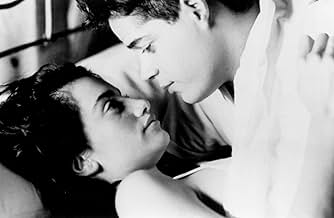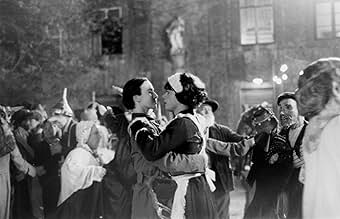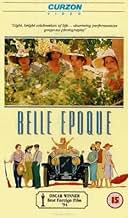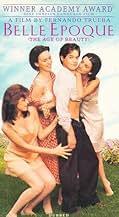CALIFICACIÓN DE IMDb
7.1/10
12 k
TU CALIFICACIÓN
En 1931, un desertor del ejército español llega a una solitaria granja, donde conoce a las cuatro hijas del granjero y se enamora de ellas.En 1931, un desertor del ejército español llega a una solitaria granja, donde conoce a las cuatro hijas del granjero y se enamora de ellas.En 1931, un desertor del ejército español llega a una solitaria granja, donde conoce a las cuatro hijas del granjero y se enamora de ellas.
- Dirección
- Guionistas
- Elenco
- Ganó 1 premio Óscar
- 25 premios ganados y 15 nominaciones en total
Joan Potau
- Paco
- (as Juan Potau)
Opiniones destacadas
Belle Epoque has many layers. At it's core is a romance which is surrounded and disguised by a classic sex farce that is itself enveloped by a philosophical tale all wrapped up in a bittersweet historical setting. Spain is, as throughout it's history, in a political struggle. In this case, a battle between the dying monarchy and the emergent republic which is,as these things go, a mild one leaving most Spaniards to enjoy their lives during this "Belle Epoque". Those familiar with it's history know that this is the short calm before the storm of the Spanish Civil War in which the Republic is replaced by the Fascist dictatorship of Franco through a bloody war. My favorite setpiece is the dance where Violeta wears Fernando's uniform and dresses him in a ball gown and wig; the rest must be seen to be believed! A lovely film! And why the devil isn't it on DVD!?
8=G=
"Belle Epoque" is a light-hearted comedy romp which tells of the goings-on at a Spanish villa (circa 1931) involving a patriarch, his four beautiful and amorous daughters, and a wayward young man who can't say "no". Fanciful, warm, fun, and sexy, this Oscar winning film flows like honey as it aims for the heart, not the crotch or head, and hits the mark. Most likely to be appreciated by more seasoned viewers with an interest in Europics. (A-)
Note - This film has considerable dialogue making for significant subtitle reading for non-Spanish speakers.
Note - This film has considerable dialogue making for significant subtitle reading for non-Spanish speakers.
Comical (farce at times), deeply human movie about an army deserter who meets up with a kindly, old, artistic gent who offers him refuge. The deserter is packed up and ready to go, until the artist's four beautiful daughters arrive. This sets in motion a plot that will keep you laughing, dialogue that will keep you thinking and characters that will keep you entertained. The humor is not forced and the chuckle is at life's absurdities, politics, most of all, human nature. Momma's entrance into the story is unique and melodic, to say the least. The movie is kind of kooky and not a by-the-numbers flick, and a satisfying watch. Sidebar: It did get the Oscar nod for Best Foreign Film.
Hard to see why anyone would compare this unfavorably with Fellini or Bergman unless they only like those with dark and/or complicated scenarios.
This is, as others have pointed out, a rite-of-passage farce. It's funny even with the subtitles.
Essentially the young man beds -and falls momentarily in love with- every young female in an eccentric Spanish clan.
The human condition is first and foremost... no one hatching nefarious plots or playing off their agenda against the dark side.
And it's incredibly beautifully shot.
This is, as others have pointed out, a rite-of-passage farce. It's funny even with the subtitles.
Essentially the young man beds -and falls momentarily in love with- every young female in an eccentric Spanish clan.
The human condition is first and foremost... no one hatching nefarious plots or playing off their agenda against the dark side.
And it's incredibly beautifully shot.
Fernando Trueba's enchanting 'Belle Epoque' is a delightful little 'folktale' that is lyrical, sensual, hilarious, whimsical and human. Azcona's cleverly written screenplay is rich with wit, sarcasm and history. In addition to that the film also looks beautiful and authentic (compared to the overload of glossy look in a majority of films).
Set in a country farm, it tells the story of a young soldier (Jorge Sanz), a deserter, who escapes and finds solace at Manolo's (Fernando Fernán Gómez) house where he falls for his four daughters, the widow (Miriam Díaz-Aroca), the lesbian (Ariadna Gil), the belle (Maribel Verdú) and the virgin (Penélope Cruz). On the surface the story sounds may sound odd but it's splendidly quirky. It successfully avoids the 'cliches' that are so evident in many European films that make it to the so-called international platform begging for a best foreign language Oscar (even though 'Belle Epoque' won it in 1993).
The storytelling here, for one, feels very natural and not one scene looks forced. The editing smoothens things finely and the score is first rate as it gives 'Belle Epoque' that final whimsical touch.
All the actors do a superb job. Fernando Fernán Gómez is very likable as the patron of the family. Miriam Díaz-Aroca, Ariadna Gil, Maribel Verdú and Penélope Cruz are excellent as the stunning looking daughters. Jorge Sanz is great as the naive hero and Gabino Diego provides wonderful comic relief.
In the end, 'Belle Epoque' is a delicious combination of humour, music, sex, romance, self-discovery and adventure, a celebration of life itself.
Set in a country farm, it tells the story of a young soldier (Jorge Sanz), a deserter, who escapes and finds solace at Manolo's (Fernando Fernán Gómez) house where he falls for his four daughters, the widow (Miriam Díaz-Aroca), the lesbian (Ariadna Gil), the belle (Maribel Verdú) and the virgin (Penélope Cruz). On the surface the story sounds may sound odd but it's splendidly quirky. It successfully avoids the 'cliches' that are so evident in many European films that make it to the so-called international platform begging for a best foreign language Oscar (even though 'Belle Epoque' won it in 1993).
The storytelling here, for one, feels very natural and not one scene looks forced. The editing smoothens things finely and the score is first rate as it gives 'Belle Epoque' that final whimsical touch.
All the actors do a superb job. Fernando Fernán Gómez is very likable as the patron of the family. Miriam Díaz-Aroca, Ariadna Gil, Maribel Verdú and Penélope Cruz are excellent as the stunning looking daughters. Jorge Sanz is great as the naive hero and Gabino Diego provides wonderful comic relief.
In the end, 'Belle Epoque' is a delicious combination of humour, music, sex, romance, self-discovery and adventure, a celebration of life itself.
¿Sabías que…?
- TriviaWhen accepting his Academy Award for Best Foreign Language Film, director (Fernando Trueba) said: "I would like to believe in God in order to thank him for this prize, but I only believe in (Billy Wilder), so... Thank you, Mr. Wilder!". Wilder himself reportedly phoned Trueba a few days later for acknowledgment and told him: "Hello Fernando, I'm God".
- ErroresAmalia sings "En un pais de fábula" from Pablo Sorozábal's zarzuela "La tabernera del puerto". The situation of the movie is in early 1930s, whereas this zarzuela was first staged in 1936.
- Bandas sonorasEn un país de fábula
(from La tabernera del puerto)
Written by Pablo Sorozábal (as Pablo Sorozabal), Guillermo Fernández Shaw and Federico Romero
Performed by Mary Carmen Ramírez
Selecciones populares
Inicia sesión para calificar y agrega a la lista de videos para obtener recomendaciones personalizadas
- How long is Belle Epoque?Con tecnología de Alexa
Detalles
- Fecha de lanzamiento
- Países de origen
- Sitio oficial
- Idiomas
- También se conoce como
- Прекрасна епоха
- Locaciones de filmación
- Arruda dos vinhos, Lisboa, Portugal(Quinta do Bulhaco: Manolo's estate at 38°56'55"N, 9°03'51"W)
- Productoras
- Ver más créditos de la compañía en IMDbPro
Taquilla
- Total en EE. UU. y Canadá
- USD 5,418,216
- Total a nivel mundial
- USD 5,418,502
- Tiempo de ejecución
- 1h 49min(109 min)
- Mezcla de sonido
- Relación de aspecto
- 2.35 : 1
Contribuir a esta página
Sugiere una edición o agrega el contenido que falta




































